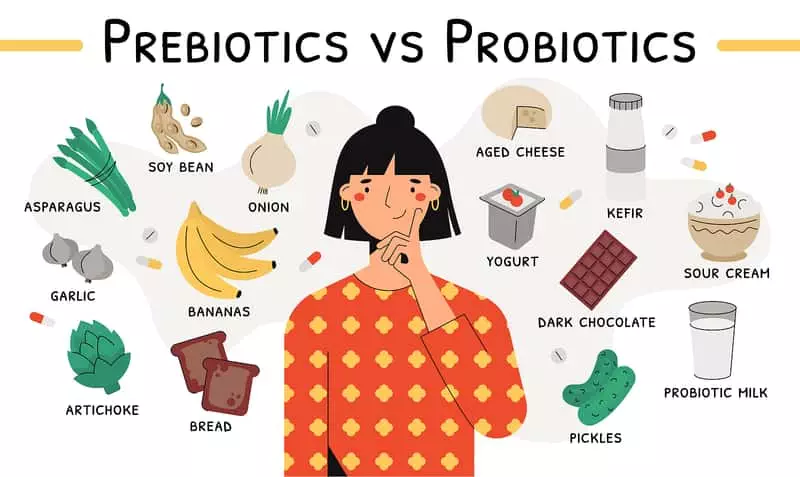Both prebiotics and probiotics are taken to help with gut health, but if you’ve ever wondered, can I take prebiotics and probiotics together, the quick answer is yes, you can.
Many people worldwide have health problems with their digestive system and have tummy problems regularly, which is one reason the sales of both prebiotics and probiotics have risen so drastically in recent years.
All of this being said, just because you can take these two supplements together doesn’t mean it is necessary. In fact, it is not necessary to take these two together, even though it is perfectly safe to do so.
Read on as I dive into this subject in more detail in the following article.
What Are Prebiotics?
The friendly bacteria in your tummy need a food source, and that is precisely what prebiotics are.
Our bodies can’t break them down, and therefore they go through the digestive tract and eventually reach the part of the colon where the friendly bacteria can be found.
Each prebiotic is broken down and turned into a food source for the probiotics in your body.
What Are Probiotics?
Probiotics are live microorganisms that are taken from humans and made into probiotic supplements. Certain foods can also have a fair amount of probiotics in them, something we’ll look into later in the article.
They supplement the good bacteria already found in the tummy area, and they not only help you stay healthy for more extended periods, but they also strengthen the immune system.
But that’s not all – they can even prevent certain illnesses from happening, further enhancing their appeal.
With a stronger immunity toward diseases and illnesses, you’re much less likely to get sick when you regularly take probiotics, which is one of the main reasons people take them in the first place.
There are numerous sources of probiotics available, so you can easily choose the most convenient ones, which usually boils down to either food products or supplements.
How Do Prebiotics and Probiotics Work Together?
So, how do prebiotics and probiotics work together? First, they help balance your digestive tract and improve the overall health of your gut immensely.
If you were to consume the recommended 25 to 30 grams of fiber per day, you likely wouldn’t need either prebiotics or probiotics.
Since this isn’t the case for most of us, you likely don’t have enough of the right type of bacteria in your gut, which is why taking probiotics is so essential.
Simply put, if you take foods or supplements that have probiotics in them, you’ll reap many health benefits, including feeling better overall and being less likely to suffer from ailments such as irritable bowel syndrome and others.
Taking prebiotics and probiotics at the same time is not necessary, however. But if you had to choose between a good prebiotic and a good probiotic, the probiotic is likely your best bet. The good bacteria in the gut will thank you for it.
What Are The Best Prebiotic Sources?
An excellent prebiotic food source is not difficult to find. Prebiotic food options include some foods you likely eat regularly, including the following:
- Apples
- Chicory root
- Corn
- Dark chocolate
- Leeks
- Oats
- Onions
- Red lentils
- Walnuts
Dark chocolate in particular can even keep you regular because it contains Lactobacillus and Bifidobacterium, which are bacteria found in the gut that dark chocolate can provide a boost to.
Even better, prebiotics stay in your system a long time and continue to improve the long-term health of your tummy to give you endless health benefits.
And if you’re looking to get in your daily dose of prebiotics with ease, you can always opt to use a high-quality prebiotic supplement to help you reach your goals.
What Are The Best Probiotic Sources?
Like prebiotics, probiotics are found in many food sources, the most obvious ones being fermented foods and dairy products such as yogurt.
A lot of these items contain live bacteria that help with lots of tummy problems and can keep you regular and pain-free month after month. Just what are foods with probiotics in them? They include the following:
- Dark chocolate (yes, it’s on both lists)
- Kefir
- Kimchi
- Kombucha
- Kvass
- Miso
- Natto
- Olives
- Pickles
- Raw cheese
- Sauerkraut
- Tempeh
Some of these items may be unfamiliar to many Americans, but oddly enough, most of them are found in your average supermarket.
Once you taste how yummy they are, you won’t have any problems adding them to your diet. Figuring out what are probiotic foods and which contain prebiotics isn’t complicated.
As you’ll learn when you do your research, many contain both probiotics and prebiotics, making it even easier to add these products to your eating habits.
The important thing to keep in mind is that when it comes to good tummy health, there are good bacteria and bad bacteria, and adding good bacteria will always be beneficial.
When it comes to your digestive health, you deserve to have the very best, and adding probiotic bacteria to your diet is an easy way to feel your best every day.
Conclusion: Can You Take Prebiotics and Probiotics At The Same Time?
Learning the difference between prebiotics and probiotics is the first step to a healthy gut and a gut that keeps your tummy and digestive parts feeling good.
Adding probiotic or prebiotic supplements is highly convenient, but getting this from the food you eat is often the better choice.
Lots of fiber is great for any type of digestive problems, but since it is so difficult to get the 25 to 30 grams of fiber from the food you eat, adding prebiotics, as well as good probiotics, is usually preferable.
Prebiotics help nourish your probiotics and are very important, which is why so many people take probiotics and prebiotics at the same time. Any good bacteria, such as probiotic bacteria, will work wonders on your overall tummy health.
Your digestive parts are designed to work better when there is a lot of fiber in your diet, but if fiber is something you lack, probiotics and even prebiotics can help get everything in your tummy working the way it should.
To recap, when it comes to your tummy health, keep the following things in mind:
- Probiotics are great, even without adding prebiotics.
- Prebiotics essentially enhance what the probiotics do, so they are very beneficial.
- Adding lots of fiber to your diet always helps to improve your health.
- Aim for an edible probiotic whenever you can instead of one in pill form.
Learning about prebiotics, probiotics, and tummy health is not as complicated as it seems. It doesn’t require medical advice to understand it all.
Just keep in mind that a good probiotic adds good bacteria to your tummy and provides better health to that part of your body, while prebiotics help to make good bacteria even better.
Best of all, both prebiotics and probiotics are inexpensive and simple to add to your daily routine, making them a no-brainer when it comes to your stomach health, especially when consuming 25 to 30 grams of fiber per day is so difficult.





Leave a Reply